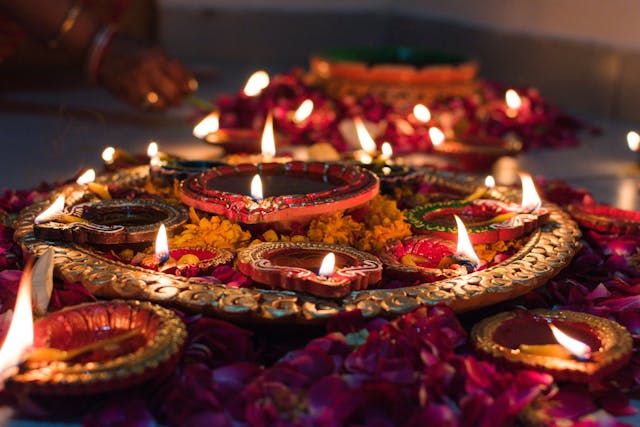
Diwali 2024 Lakshmi Puja Muhurat Time for major cities of India
Posted on October 30, 2024
The tithi time for Diwali 2024 begins at 3:52 PM on October 31 and ends at 6:16 PM on November 1.
Lakshmi Puja is one of the most significant rituals during Diwali, the festival of lights, celebrated by millions in India and across the world. Diwali, a festival symbolizing the victory of light over darkness and good over evil, is also deeply associated with the worship of Goddess Lakshmi, the Hindu goddess of wealth, prosperity, and abundance. Lakshmi Puja is typically observed on the third day of the five-day Diwali festival and holds immense cultural and spiritual importance.
Lakshmi Puja Muhurat Time for major cities of India on 1 November 2024
1) Jaipur, Rajasthan: 05:44 PM to 06:16 PM
2) Delhi: 05:36 PM to 06:16 PM
3) Ahmedabad, Gujarat: 06:52 PM to 08:35 PM
4) Patna, Bihar: 05:08 PM to 06:16 PM
5) Mumbai, Maharashtra: 06:57 PM to 08:36 PM
6) Bengaluru, Karnataka: 06:47 PM to 08:21 PM
7) Bhopal, Madhya Pradesh: 05:42 PM to 06:16 PM
8) Raipur, Chhattisgarh: 05:27 PM to 06:16 PM
9) Hyderabad, Telangana: 05:44 PM to 06:16 PM
10) Chennai, Tamil Nadu: 05:42 PM to 06:16 PM
11) Kolkata, West Bengal: 05:45 PM to 06:16 PM
12) Lucknow, Uttar Pradesh: 05:23 PM to 06:16 PM
13) Chandigarh: 05:35 PM to 06:16 PM
14) Bhubaneswar, Odisha: 05:12 PM to 06:16 PM
15) Shimla, Himachal Pradesh: 05:33 PM to 06:16 PM
16) Dehradun, Uttarakhand: 05:30 PM to 06:16 PM
17) Ranchi, Jharkhand: 05:10 PM to 06:16 PM
18) Nagpur, Maharashtra: 05:38 PM to 06:16 PM
19) Pune, Maharashtra: 06:54 PM to 08:33 PM
20) Noida: 05:35 PM to 06:16 PM
21) Gurgaon: 05:37 PM to 06:16 PM
Significance of Lakshmi Puja on Diwali
Lakshmi Puja is believed to bring wealth, good fortune, and prosperity to households and businesses for the coming year. The day is celebrated with the belief that Goddess Lakshmi, who brings blessings and abundance, descends to earth on Diwali night and visits homes that are clean, well-lit, and welcoming. Many people see this puja as a way to express gratitude for the blessings received and as a form of asking for continued protection and fortune.
The timing of Lakshmi Puja is also important. Diwali is celebrated on the new moon (Amavasya) in the Hindu month of Kartika, which falls between October and November. Many believe that the darkest night of the year makes the light of lamps even more inviting to Lakshmi, who is known as the bringer of light and fortune.
Rituals of Lakshmi Puja
The rituals for Lakshmi Puja can vary between regions and communities, but the primary elements remain consistent.
-
Preparations and Cleaning: The first step involves cleaning homes and workspaces, which symbolizes the removal of any negativity or impurities. Many families also decorate their homes with rangoli (colourful patterns created with powders or flowers) at the entrance to welcome the goddess.
-
Lighting Diyas (Lamps): Lamps are lit around the house and in front of the Lakshmi idol or image to illuminate the way for the goddess. This tradition represents the triumph of light over darkness and is also thought to invite Lakshmi into homes.
-
Placing Idols and Offerings: Images or idols of Goddess Lakshmi, often placed alongside Lord Ganesha (who represents good fortune and the remover of obstacles), are set up on a clean altar. Offerings such as fruits, sweets, flowers, and coins are placed in front of the goddess, as these symbolize abundance and gratitude.
-
Performing the Puja: The puja includes a series of rituals starting with a prayer to Lord Ganesha, followed by the main Lakshmi Puja. The family prays to Lakshmi, chanting mantras, and often reads sacred texts or shlokas dedicated to her. Rice, flowers, and sweets are used as offerings while reciting the mantras. This is followed by an aarti, where a lamp is waved in front of the goddess, symbolizing respect and devotion.
-
Offering Naivedya (Sacred Food): Foods like sweets and fruits are offered to the goddess as Naivedya. Once the puja is complete, these offerings are distributed as prasad among family members and guests.
-
Chanting and Singing Devotional Songs: Many families sing bhajans (devotional songs) and chant Lakshmi mantras during the puja to show their devotion and invite her blessings.
-
Distributing Wealth: An old tradition associated with Lakshmi Puja is giving and receiving gifts, especially as it involves the exchange of wealth in the form of money or symbolic items like silver or gold coins, reflecting Lakshmi’s blessing of prosperity.
